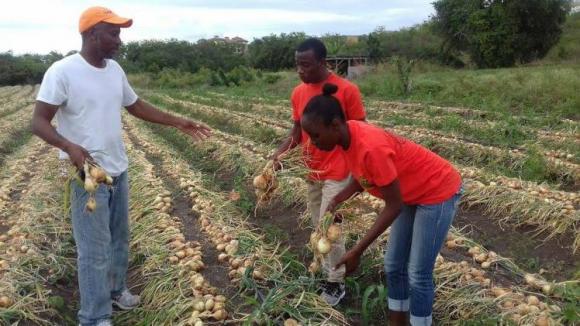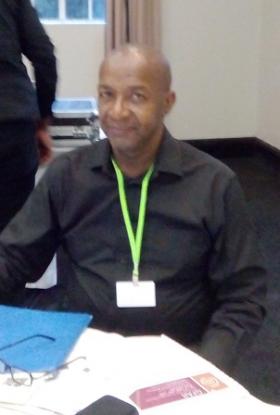-
About
- Our Work
- Get Involved
- Stay Updated
The Chief is a Leader among Equals

This blogpost by Iana Perevoshchikova orginally appeared on the GFAR Blog.
Early this year, I opened my e-mail inbox and read the announcement about GCARD3 – Third Global Conference on Agricultural Research for Development–and immediately I got the feeling that I should just go for it. I applied to participate as a social reporter and soon I found out I had been selected–I was on my way!
The Conference was organized around five themes, all of them were interesting, so it was a hard choice to come up with one. Since I work as an export manager for a company which produces innovative special fertilizers, I decided to participate in theme 4 – Sustaining the Business of Farming. I am very thankful to the organizers of GCARD3 for providing me this unique chance in my life to get involved in dialogue with all stakeholders on topical issues for Agricultural Development.
A few minutes after the start of the group session I had selected, I have realized that I would not regret my choice. We had a very charismatic group leader – Mr. Jethro Greene, who is head of the Caribbean Farmers Network. I was impressed by his experience working in the field and was happy that the discussion would be practical. Moreover, I decided to deepen the conversation and asked Mr. Greene for an interview, which I would like to share with the reader in this blog post.
 Caribbean Farmers Network (CaFAN) is a non-governmental regional organization, which was formed by farmer organizations across the Caribbean in 2002. CaFAN’s main goals are to improve the quality of life for small farm families throughout the Caribbean region so that they can gain economic empowerment and socio-political independence. CaFAN currently represents over 500,000 small farmers within twenty farmers’ organizations spread across fifteen Caribbean countries. Main crops that CaFAN produces and supplies are roots and tubers ie taro, sweet potatoes and a varieties of fruits, spices and vegetables ie ginger, butternut squash, plantains. Mr. Jethro Greene is the Chief Coordinator of CaFAN and he was happy to share his experience with me.
Caribbean Farmers Network (CaFAN) is a non-governmental regional organization, which was formed by farmer organizations across the Caribbean in 2002. CaFAN’s main goals are to improve the quality of life for small farm families throughout the Caribbean region so that they can gain economic empowerment and socio-political independence. CaFAN currently represents over 500,000 small farmers within twenty farmers’ organizations spread across fifteen Caribbean countries. Main crops that CaFAN produces and supplies are roots and tubers ie taro, sweet potatoes and a varieties of fruits, spices and vegetables ie ginger, butternut squash, plantains. Mr. Jethro Greene is the Chief Coordinator of CaFAN and he was happy to share his experience with me.Q: Do you work mainly with professional or with subsistence farmers?
A: Our farmers have less than 5 ha of land and are divided in three categories: Commercial farmers, partly-commercial (part-time farming), and subsistence emerging farmers.
Q: Can any farmer become part of the CaFAN cluster or do you have some criteria that the farmer has to fulfil?
A: Yes, any farmer can join us, but we have some guiding principles of farming for our members: Our approach is to create an enabling environment that facilitate farmers to work in groups and clusters formal and informal. These groups and clusters become members of the CaFAN network.
We encourage them to incorporate organic material back to the soil, and to practice crop rotation. We also encourage them to do a soil test, based on which they can apply the right type and quantity of fertilizers.
Therefore, we promote and fully support sustainable agriculture principles and values.
Q: How do you organize the work of the cluster, is there a head of the group and is he/she selected through a democratic approach?
A: There is a theory of organization written in books, according to which the leader has to have more than fifty personal characteristics, which in reality no one has. Therefore, my firm belief is that the only successful leadership is team leadership. The Chief is a leader among the equals. If today he can’t come, there is another one to substitute him. Only thanks to team efforts, sharing information and being transparent, can good results be achieved. We try to avoid a top-down approach, especially because Caribbean farmers are very independent people.
Q: How do you implement the activities in practice? Do you organize meetings often?
A: Farmers are very practical people, unless they see results, they won’t implement the proposed activities. Obviously, they are busy, therefore there is a rule – do not call for a meeting unless it’s absolutely necessary. If you can solve the issue with a phone call, please, do it.
Q; What are the main challenges you are faced with?
A: As farmers usually grow up in farming families, production is not a problem. The main challenge is marketing of the goods and sustaining the profit, since farmers are not familiar with these aspects of the business.
Thank you very much for your time and sharing this information with us. I wish you good luck and a lot of success for the future towards sustainable agriculture!
After the interview, I was thinking a lot about the words of Mr. Greene: “The Chief is a leader among equals”. This topic came through the whole event. Being a young woman, I could freely take part in all the discussions during the Forum, give my inputs and contribute to the overall strategy of agricultural development, which was discussed during the event. In the plenary sessions, there were young farmers, who shared their experience and problems with all the community involved in decision-making. In fact, the overarching theme of GCARD3 was: “No One Left Behind: Agri-food Innovation and Research for a Sustainable World”. Maybe it’s time for us to take the up the needed leadership on behalf of the farmers, youth and women and be “chiefs among equals” to ensure sustainable agricultural development?!
Blogpost by Iana Perevoshchikova, #GCARD3 Social Reporter –9nkin86(at)gmail.com
Photo Credit: CAFAN
This post is part of the live coverage during the #GCARD3 Global Conference in Johannesburg, South Africa, 5-8 April 2016. This post is written by one of our social reporters, and represents the author’s views only.
Tags:About the author
Related Posts
Comments
No comments made yet. Be the first to submit a commentBy accepting you will be accessing a service provided by a third-party external to https://www.ypard.net/
Get in touch
Email: [email protected]
YPARD Global Coordination UnitHosted by AGRIDEA and the Czech University of Life Sciences Prague
Lausanne, Switzerland and Prague, Czech Republic - Our Work


 Caribbean Farmers Network (CaFAN)
Caribbean Farmers Network (CaFAN)